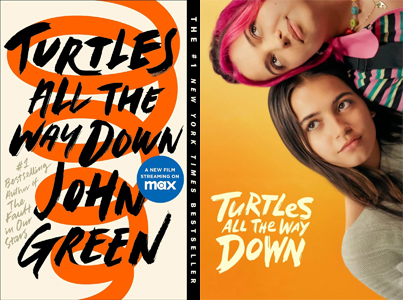John Green does a magnificent job of getting into the head of a teen girl with mental-health struggles in “Turtles All the Way Down” (2017, and a faithful movie adaptation from May – more on that below). He makes Aza and her Gen-Z friends genuine and flawed, yet not all that annoying.
Green’s prose has become more graceful and poetic since his strong debut, “Looking for Alaska” (2005). “Turtles” is so smoothly readable, with such honest friend and family relationships for narrator Aza, that it’s only upon reflection that I realize the book lacks a gripping outer plot (as in the stuff outside Aza’s head).
Calling to mind Christina Ricci’s character in “Prozac Nation” (2001) – itself based on a memoir by depression-addled Voice of Gen-X Elizabeth Wurtzel – “Turtles” finds OCD-addled Gen-X’er Green pouring at least some of himself into his Gen-Z lead. Aza is armed with a doctor’s guidance, pills and love – but it’ll still be a battle.

“Turtles All the Way Down” (2017)
Author: John Green
Genre: Young adult character drama
Setting: 2017, Indianapolis
Her intrusive overthinking stems from her knowledge that she (like all humans) is significantly made up of bacteria. This is both the triggering thought that gives her bouts of flee-the-area-right-now anxiety, and – from a literary standpoint — a metaphor for how she’s not in control of herself.
Aza is a lot, but worth it
It’s not fun for Aza to be Aza, and it’s sometimes not fun for bestie Daisy and boyfriend Davis to be around her. Daisy – the Type-A personality of the friendship — struggles to communicate this, and also to communicate that despite her irritation with Aza, she still would not trade their friendship for anything.
I have depression and anxiety (for which I take a pill, like Aza does) and I can say Green magnificently captures the feelings of 1, not fitting in; 2, knowing what you need to do (or not do) to be normal; and 3, not being able to do those things, regardless.
As with “Prozac Nation,” “Turtles” isn’t going to end with a major victory; at best it’s going to end with Aza feeling like she has the tools to get through each day. It’s a story of a process more so than a cure. Green makes this clear most of the way, so it’s a misfire at the end (though not enough to sully the preceding pleasures) when our narrator becomes future-omniscient and looks back at the book’s events.
Now as for these events: Aza’s neighbor on the other side of the river (this fictionalized Indianapolis’ version of “the other side of the tracks”) is a rich corporatist who goes missing when the authorities pursue him. Aza was sort of friends with the son, Davis, when she was younger, and they hit it off again.

The budding romance passages are sweet, they illustrate the struggles of someone with anxiety and body dysmorphia in dating, and they show how class differences are not an impossible hurdle (well, especially if Davis is a Manic Pixie Dream Boy, but still). In a modern touch, many Aza-Davis scenes are via texting rather than in-person, but that makes their nights under the stars resonate with specialness.
Not exactly a Scooby Gang
Aza’s and Daisy’s search for clues in Davis’ dad’s disappearance is in the background … way in the background. I bet when I peruse others’ reviews of “Turtles” they’ll note that the mystery is the novel’s major failure. This is both right and wrong.
Wrong because it’s always clear Green is not invested in this thread; Aza and Daisy have little reason to be amateur sleuths, because even Davis isn’t entirely sure he wants his not-so-great dad found. It’s perhaps a case where the novel needed a smidgen of a reason to exist. So here we have excuses for Aza and Davis, and Aza and Daisy, to get together that are a little more interesting than standard school-lunchroom meet-ups.
But the criticism of the barely-a-mystery isn’t totally off base, because it is weird to introduce a puzzle and a word clue (“jogger’s mouth”) and not even try to do anything interesting – or even all that sensible — with them. Additionally, Green strongly suggests Davis’ father earned his fortune through corruption, yet there’s no clarity that his family will lose that fortune via whatever legal charges he has run away from.
So Green’s seventh book has a shaky – both structurally and thematically – narrative foundation. But Aza is a magnificently realized character, Daisy is also pretty good (I’ll give her a pass on liking Disney “Star Wars”) and Davis is quite likable for a Richie Rich (and he gets bonus points for liking “Jupiter Ascending”).
The characterization grade is so high it nearly cancels out the novel’s troubles in other areas. “Turtles All the Way Down” is not a normal book. But hey, it plays to its strengths – something Aza is gradually learning to do too.
THE MOVIE
The straight-to-Max movie version of “Turtles All the Way Down” accurately captures the book. Inevitably, it’s missing the rhythms of the prose – Green’s strength – and it retains all the flaws. So this project does fit the “book is always better” cliché, but director Hannah Marks delivers a respectable adaptation.
Writers Elizabeth Berger and Isaac Aptaker, who penned the cute 2022 rom-com “I Want You Back,” are in service of Green’s insights (mental-health problems) and biases (college and love as the paths to happiness). The mystery is even thinner than in the novel, perhaps a missed opportunity. But their only major addition is a good one: Aza (Isabela Merced) visits Northwestern and the professor (J. Smith-Cameron, adding class) directly delivers the metaphor that explains the title.
“Turtles All the Way Down” (2024)
Director: Hannah Marks
Writers: Elizabeth Berger, Isaac Aptaker (screenplay), John Green (novel)
Stars: Isabela Merced, Cree, Judy Reyes
Merced (Green’s “Let It Snow”) is clearly a future star, but the makeup crew makes her looks suitably sweaty to match Green’s Aza. Cree is good as bestie Daisy, though a bit cocky, and it bothers me that someone whose main hobby is writing Chewbacca fanfic doesn’t know how to spell Wookiee. Felix Mallard is miscast as Davis. The “just what Aza needs” personality is in place but he’s too much of a physical specimen, which is especially ridiculous when he expresses Davis’ hangup about having skinny arms.
Using Cincinnati as a stand-in for Indianapolis, the film’s production is strong, from Davis’ mansion to the literally underground art show. I have to give a shout-out to the post-production team for putting most of the texts between Aza and Davis in large letters on the screen. Most modern movies have no sympathy for people not watching on giant screens; “Turtles” does.
The book’s strength is that it makes teens (and, heck, adults too) with mental-health struggles feel understood, and allows mentally stable people to understand it. The film does so with shots of bacteria under magnification, combined with Aza’s narration. It’s not flashy, and it never second-guesses Green (even when it should). While the cinematic “Turtles All the Way Down” lacks the novel’s prose magic, both book fans and film-only viewers should be satisfied.
Novel: 4 stars
Movie: 3.5 stars

